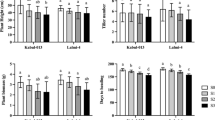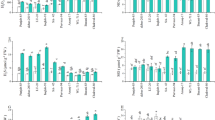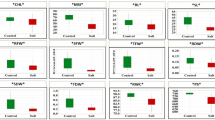Abstract
The salinity tolerance of 17 breeding wheat genotypes along with three local varieties was evaluated under control and salinity stress (160 mM NaCl) conditions. At the seedling stage, several growth and physiological traits were measured. Moreover, the investigated genotypes were assessed in terms of grain yield across four saline regions during the 2018–2019 cropping seasons. Salinity treatment significantly decreased in the root and shoot dry weights (RDW and SDW), photosynthesis rate (PN), stomatal conductance (GS), transpiration rate (TE), shoot K+ content (SK), root K+/Na+ (RKN), shoot K+/Na+ (SKN), root-to-shoot Na+ translocation (RTSN), and root-to-shoot K+ translocation (RTSK), but resulted in increased root Na+ content (RN), root K+ content (RK), and shoot Na+ content (SN). The results of additive main effects and multiplicative interaction analysis (AMMI) also indicated significant differences among test environments (E), genotypes (G), and their interaction effects (GEI). The PCA-based biplot revealed that grain yield strongly correlated with RKN and RK. Furthermore, the correlation among PN, GS, and TE traits was strong and positive and had a positive correlation with RWC, MSI, RDW, and SPAD index. Considering our results, RK and RKN were identified as useful physiological tools to screen salt tolerance at the early-growth stage. According to the ranking patterns obtained by the average sum of ranks method (ASR) and grain yield, we observed that genotype number G5 had considerable physiological potential at the early-growth stage and also responded well to soil salinity at the farm; thus, this genotype can be promoted for commercial production.



Similar content being viewed by others
References
Acosta-Motos JR, Ortuno MF, Bernal-Vicente A, Diaz-Vivancos P, Sanchez-Blanco MJ, Hernandez JA (2017) Plant responses to salt stress: adaptive mechanisms. Agronomy 7:18. https://doi.org/10.3390/agronomy7010018
Afzal I, Rauf S, Basra SMA, Murtaza G (2008) Halopriming improves vigor, metabolism of reserves and ionic contents in wheat seedlings under salt stress. Plant Soil Environ 54:382–388. https://doi.org/10.17221/408-PSE
Ahmadi J, Pour-Aboughadareh A, Fabriki Ourang S, Poczai KPP (2020) Unraveling salinity stress responses in ancestral and neglected wheat species at early growth stage: a baseline for utilization in future wheat improvement programs. Physiol Mol Biol Plants 26:537–549. https://doi.org/10.1007/s12298-020-00768-4
Ahmadi J, Pour-Aboughadareh A, Fabriki-Ourang S, Mehrabi AA, Siddique KHM (2018) Screening wild progenitors of wheat for salinity stress at early stages of plant growth: insight into potential sources of variability for salinity adaptation in wheat. Crop Pasture Sci 69:649–658. https://doi.org/10.1071/CP17418
Ahmed IM, Cao F, Zhang M, Chen X, Zhang G, Wu F (2013) Difference in yield and physiological features in response to drought and salinity combined stress during anthesis in Tibetan wild and cultivated barleys. PLoS ONE 8:e77869. https://doi.org/10.1371/journal.pone.0077869
Akbarimoghaddam H, Galavi M, Ghanbari A, Panjehkeh N (2011) Salinity effects on seed germination and seedling growth of bread wheat cultivars. Trakia J Sci 9:43–50
Ali MA, Niaz S, Abbas A, Sabir W, Jabran K (2009) Genetic diversity and assessment of drought tolerant sorghum landraces based on morph-physiological traits at different growth stages. Plant Omics 2:214–227
Anil VS, Krishnamurthy H, Mathew MK (2007) Limiting cytosolic Na+ confers salt tolerance to rice cells in culture: a two-photon microscopy study of SBFI loaded cells. Physiol Plant 129:607–621. https://doi.org/10.1111/j.1399-3054.2006.00854.x
Arfan M, Athar HR, Ashraf M (2007) Does exogenous application of salicylic acid through the rooting medium modulate growth and photosynthetic capacity in difgerently adapted spring wheat cultivated under salt stress? J Plant Physiol 6:685–694. https://doi.org/10.1016/j.jplph.2006.05.010
Arzani A, Ashraf A (2016) Smart engineering of genetic resources for enhanced salinity tolerance in crop plants. Crit Rev Plant Sci 35:146–189. https://doi.org/10.1080/07352689.2016.1245056
Asif M, Kamran A (2011) Plant breeding for water-limited environments. Crop Sci 51:2911–2912. https://doi.org/10.2135/cropsci2011.12.0004br
Athar HUR, Khan A, Ashraf M (2007) Exogenously applied ascorbic acid alleviates salt-induced oxidative stress in wheat. Environ Exp Bot 63:224–231. https://doi.org/10.1016/j.envexpbot.2007.10.018
Blum A (2010) Plant breeding for water-limited environments. Springer, New York
Carillo P, Grazia Annunziata M, Pontecorvo G, Fuggi A, Woodrow P (2011) Salinity stress and salt tolerance. In: Shanker A (ed) Abiotic stress in plants—mechanisms and adaptations. IntechOpen, UK, pp 21–38
Chen F, Dahal P, Bradford KJ (2001) Two tomato expansin genes show divergent expression and localization in embryos during seed development and germination. Plant Physiol 127:928–936. https://doi.org/10.1104/pp.010259
Dadshani S, Sharma RC, Baum M, Ogbonnaya FC, Leon J, Ballvora A (2019) Multidimensional evaluation of response to salt stress in wheat. PLoS ONE 14:e0222659. https://doi.org/10.1371/journal.pone.0222659
Davenport R, James R, Zakrisson-Plogander A, Tester M, Munns R (2005) Control of sodium transport in durum wheat. Plant Physiol 137:807–818. https://doi.org/10.1104/pp.104.057307
Ebrahim F, Arzani A, Rahimmalek M, Sun D, Peng J (2019) Salinity tolerance of wild barley Hordeum vulgare ssp. spontaneum. Plant Breed 139:304–316. https://doi.org/10.1111/pbr.12770
ElBasyoni I, Saadalla M, Baenziger S, Bockelman H, Morsy S (2017) Cell membrane stability and association mapping for drought and heat tolerance in a worldwide wheat collection. Sustainability 9:1606. https://doi.org/10.3390/su9091606
Farooq S, Azam F (2006) The use of cell membrane stability (CMS) technique to screen for salt tolerant wheat varieties. J Plant Physiol 163:629–637. https://doi.org/10.1016/j.jplph.2005.06.006
Food and Agriculture Organization (2020) Cereal supply and demand brief. http://www.fao.org/worldfoodsituation/csdb/en/. Accessed 20 May 2020
Geilfus CM, Niehaus K, Godde V, Hasler M, Zorb C, Gorzolka K, Jezek M, Senbayram M, Ludwing-Muller J, Muhling KH (2015) Fast responses of metabolites in Vicia faba L. to moderate NaCl stress. Plant Physiol Biochem 92:19–29. https://doi.org/10.1016/j.plaphy.2015.04.008
Genc Y, Oldach K, Verbyla AP, Lott G, Hassan M, Tester M, Wallwork H, McDonald GK (2010) Sodium exclusion QTL associated with improved seedling growth in bread wheat under salinity stress. Theor Appl Genet 121:877–894. https://doi.org/10.1007/s00122-010-1357-y
GENSTAT [computer software]. (2008). VSN International Ltd.
Ghiyasi M, Seyahjani AA, Tajbakhsh M, Amirnia R, Salehzadeh H (2008) Effect of osmopriming with polyethylene glycol (8000) on germination and seedling growth of wheat (Triticum aestivum L.) seeds under salt stress. Res J Biol Sci 3:1249–1251
Guo R, Yang Z, Li F, Yan C, Zhong X, Liu Q, Xia X, Li H, Zhao L (2015) Comparative metabolic responses and adaptive strategies of wheat (Triticum aestivum) to salt and alkali stress. BMC Plant Biol 15:170. https://doi.org/10.1186/s12870-015-0546-x
Hagemann M, Erdmann N (1997) Environmental stresses. In: Rai AK (ed) Cyanobacterial nitrogen metabolism and environmental biotechnology. Springer, Heidelberg, pp 156–221
Hasanuzzaman M, Nahar K, Rahman A, Anee TI, Alam MU, Bhuiyan TF, Oku H, Fujita M (2017) Approaches to enhance salt stress tolerance in wheat. In: Wanyera R (ed) Wheat improvement, management and utilization. InTech, London, pp 151–187. https://doi.org/10.5772/67247
Hasegawa PM, Bressan RA, Zhu JK, Bohnert HJ (2000a) Plant cellular and molecular responses to high salinity. Annu Rev Plant Physiol Plant Mol Biol 51:463–499. https://doi.org/10.1146/annurev.arplant.51.1.463
Hemantaranjan A (2014) Heat stress responses and thermotolerance. Adv Plants Agric Res 1:1–10. https://doi.org/10.15406/apar.2014.01.00012
Hoagland DR, Arnon DI (1950) The water-culture method for growing plants without soil. California Agricultural Experiment Station, Circular No. 374. The College of Agriculture, University of California, USA
Husain S, Munns R, Condon AG (2003) Effect of sodium exclusion trait on chlorophyll retention and growth of durum wheat in saline soil. Aust J Agr Res 54:589–597. https://doi.org/10.1071/AR03032
Isayenkov SV, Maathuis FJM (2019) Plant salinity stress: many unanswered questions remain. Front Plant Sci 10:80. https://doi.org/10.3389/fpls.2019.00080
Islam F, Yasmeen T, Ali S, Ali B, Farooq MA, Gill RA (2015) Priming-induced antioxidative responses in two wheat cultivars under saline stress. Acta Physiol Plant 37:153. https://doi.org/10.1007/s11738-015-1897-5
Islam F, Yasmeen T, Arif MS, Ali S, Ali B, Hameed S, Zhou W (2016) Plant growth promoting bacteria confer salt tolerance in Vigna radiate by up-regulating antioxidant defense and biological soil fertility. Plant Growth Regul 80:23–36. https://doi.org/10.1007/s10725-015-0142-y
Kawasaki S, Borchert C, Deyholos M, Wang H, Brazille S, Kawai K, Galbraith D, Bohnert HJ (2001) Gene expression profiles during the initial phase of salt stress in rice. Plant Cell 13:889–905. https://doi.org/10.1105/tpc.13.4.889
Ketata HY, Yau SK, Nachit M (1989) Relative consistency performance across environments. In: International Symposium on physiology and breeding of winter cereals for stressed Mediterranean environments. Montpellier, July 3–6, pp 391–400
Liu S, Constable G, Stiller W (2020) Using leaf sodium concentration for screening sodicity tolerance in cotton (Gossypium hirsutum L.). Field Crop Res 46:107678. https://doi.org/10.1016/j.fcr.2019.107678
Long M, Shou J, Wang J, Hu W, Hannan F, Mwamba TM, Farooq MA, Zhou W, Islam F (2020) Ursolic acid limits salt-induced oxidative damage by interfering with nitric oxide production and oxidative defense machinery in rice. Front Plant Sci 11:697. https://doi.org/10.3389/fpls.2020.00697
Maghsoudi K, Emam Y, Pessarakli M (2016) Effect of silicon on photosynthetic gas exchange, photosynthetic pigments, cell membrane stability and relative water content of different wheat cultivars under drought stress conditions. J Plant Nutr 39:1001–1015. https://doi.org/10.1080/01904167.2015.1109108
Mahlooji M, Seyed Sharifi R, Razmjoo J, Sabzalian MR, Sedghi M (2018) Effect of salt stress on photosynthesis and physiological parameters of three contrasting barley genotypes. Photosynthetica 56:549–556. https://doi.org/10.1007/s11099-017-0699-y
Masoudi B, Mardi M, Majidi Hervan E, Bihamta MR, Naghavi MR, Nakhoda B, Amini A (2015) QTL mapping of salt tolerance traits with different effects at the seedling stage of bread wheat. Plant Mol Biol Rep 33:1790–1803. https://doi.org/10.1007/s11105-015-0874-x
Misra A, Sahu AN, Misra M, Singh P, Meera I, Das N, Kar M, Sahu P (1997) Sodium chloride induced changes in leaf growth, and pigment and protein contents in two rice cultivars. Biol Plant 39:257–262. https://doi.org/10.1023/A:1000357323205
Munns R, Schachtman D, Condon A (1995) The significance of a two-phase growth response to salinity in wheat and barley. Funct Plant Biol 22:561–569. https://doi.org/10.1071/PP9950561
Neill SJ, Desikan R, Clarke A, Hurst RD, Hancock JT (2002) Hydrogen peroxide and nitric oxide as signaling molecules in plants. J Exp Bot 53:1237–1247. https://doi.org/10.1093/jexbot/53.372.1237
Nevo E, Chen G (2010) Drought and salt tolerances in wild relatives for wheat and barley improvement. Plant Cell Environ 33:670–685. https://doi.org/10.1111/j.1365-3040.2009.02107.x
Panwar M, Tewari R, Gulati A, Nayyar H (2016) Indigenous salt-tolerant rhizobacterium Pantoea dispersa (PSB3) reduces sodium uptake and mitigates the effects of salt stress on growth and yield of chickpea. Acta Physiol Plant 38:278. https://doi.org/10.1007/s11738-016-2284-6
Pietragalla J, Pask AJD (2012) Physiological breeding II. In: Pietragalla H, Pask AJD, Mullan D, Reynold MP (eds) A field guide to wheat phenotyping. CIMMYT, Mexico, pp 15–17
Pour-Aboughadareh A, Ahmadi J, Mehrabi AA, Etminan A, Moghaddam M, Siddique KHM (2017) Physiological responses to drought stress in wild relatives of wheat: Implications for wheat improvement. Acta Physiol Plant 39:106. https://doi.org/10.1007/s11738-017-2403-z
Pour-Aboughadareh A, Etminan A, Abdelrahman M, Siddique KHM, Tran LSP (2020) Assessment of biochemical and physiological parameters of durum wheat genotypes at the seedling stage during polyethylene glycol-induced water stress. Plant Growth Regul. https://doi.org/10.1007/s10725-020-00621-4
Pour-Aboughadareh A, Omidi M, Naghavi MR, Etminan A, Mehrabi AA, Poczai P, Bayat H (2019) Effect of water deficit stress on seedling biomass and physio-chemical characteristics in different species of wheat possessing the D genome. Agronomy 9:522. https://doi.org/10.3390/agronomy9090522
Qadir M, Quillerou E, Nangia V, Murtaza G, Singh M, Thomas RJ, Drechsel P, Noble AD (2014) Economics of salt-induced land degradation and restoration. Nat Resour Forum 38:282–295. https://doi.org/10.1111/1477-8947.12054
Qin J, Dong WY, He KN, Yu Y, Tan GD, Han L, Dong M, Zhang YY, Zhang D, Li AZ, Wang ZI (2010) NaCl salinity induced changes in water status, ion contents and photosynthetic properties of Shepherdia argentea (Pursh) Nutt seedlings. Plant Soil Environ 56:325–332. https://doi.org/10.17221/209/2009-PSE
Rahnama A, Fakhri S, Meskarbashee M (2019) Root growth and architecture responses of bread wheat cultivars to salinity stress. Agron 111:2991–2998. https://doi.org/10.2134/agronj2018.12.0795
Roy SJ, Negrao S, Tester M (2014) Salt resistant crop plants. Curr Opin Biotechnol 26:115–124. https://doi.org/10.1016/j.copbio.2013.12.004
Sadak M (2019) Physiological role of trehalose on enhancing salinity tolerance of wheat plant. Bull Natl Res Cent 43:53. https://doi.org/10.1186/s42269-019-0098-6
Sairam RK, Veerabhadra R, Srivastava GC (2002) Differential response of wheat genotypes to long term salinity stress in relation to oxidative stress, antioxidant activity and osmolyte concentration. Plant Sci 163:1037–1046. https://doi.org/10.1016/S0168-9452(02)00278-9
Saqib M, Zorb C, Rengel Z, Schubert S (2005) The expression of the endogenous vacuolar Na+/H+ antiporters in roots and shoots correlates positively with the salt resistance of wheat (Triticum aestivum L.). Plant Sci 169:959–965. https://doi.org/10.1016/j.plantsci.2005.07.001
Senguttuvel P, Vijayalakshmi C, Thiyagarajan K, Kannanbapu JR, Kota S, Padmavathi G, Geetha S, Sritharan N, Viraktamath BC (2014) Changes in photosynthesis, chlorophyll fluorescence, gas exchange parameters and osmotic potential to salt stress during early seedling stage in rice (Oryza sativa L.). SABRAO J Breed Genet 46:120–135
Singh P, Mahajan MM, Singh NK, Kumar D, Kumar K (2020) Physiological and molecular response under salinity stress in bread wheat (Triticum aestivum L.). J Plant Biochem Biot 29:125–133. https://doi.org/10.1007/s13562-019-00521-3
Suarez N, Medina E (2008) Salinity effects on leaf ion composition and salt secretion rate in Avicennia germinans (L.) L. Braz J Plant Physiol 20:131–140. https://doi.org/10.1590/S1677-04202008000200005
Suriya-Arunroj D, Supapoj N, Toojinda T, Vanavichit A (2004) Relative leaf water content as an efficient method for evaluating rice cultivars for tolerance to salt stress. Sci Asia 30:411–415. https://doi.org/10.2306/scienceasia1513-1874.2004.30.411
Talukder SK, Babar MA, Vijayalakshmi K, Poland J, Prasad PVV, Bowden R, Fritz A (2014) Mapping QTL for the traits associated with heat tolerance in wheat (Triticum aestivum L.). BMC Genet 15:1–13. https://doi.org/10.1186/s12863-014-0097-4
Xu Y-F, An D-G, Liu D-C, Zhang A-M, Xu H-X, Li B (2012) Mapping QTLs with epistatic effects and QTL× treatment interactions for salt tolerance at seedling stage of wheat. Euphytica 186:233–245. https://doi.org/10.1007/s10681-012-0647-7
Zeeshan M, Lu M, Sehar S, Holford P, Wu F (2020) Comparison of biochemical, anatomical, morphological, and physiological responses to salinity stress in wheat and barley genotypes deferring in salinity tolerance. Agronomy 10:127. https://doi.org/10.3390/agronomy10010127
Zhu X, Cao Q, Sun L, Yang X, Yang W, Zhang H (2018) Stomatal conductance and morphology of arbuscular mycorrhizal wheat plants response to elevated CO2 and NaCl stress. Front Plant Sci 9:1363. https://doi.org/10.3389/fpls.2018.01363
Zobel RW, Wright MJ, Gauch HG (1998) Statistical analysis of yield trials. Agron J 80:388–393. https://doi.org/10.2134/agronj1988.00021962008000030002x
Zou P, Li K, Liu S, He X, Zhang X, Xing R, Li P (2016) Effect of sulfated chitooligosaccharides on wheat seedlings (Triticum aestivum L.) under salt stress. J Agri Food Chem 64:2815–2821. https://doi.org/10.1021/acs.jafc.5b05624
Acknowledgements
The authors acknowledge the lab facilities support (No. 2-03-03-236-980895) from the Seed and Plant Improvement Institute (SPII), Agricultural Research, Education and Extension Organization (AREEO), Iran. The authors thank the reviewers and the editor of Acta Physiologiae Plantarum for providing helpful comments and corrections on earlier drafts of this manuscript. Also, the first author is grateful to Dr. Peter Poczai, from the Botany Unit, Finnish Museum of Natural History, University of Helsinki, for his fruitful comments and improve the langue of the manuscript. Furthermore, the authors acknowledge the Research Square for sharing our manuscript as a preprint (https://doi.org/10.21203/rs.3.rs-158975/v1) before the final publishing.
Author information
Authors and Affiliations
Corresponding author
Ethics declarations
Conflict of interest
The authors declared no conflict of interest.
Additional information
Communicated by S. Renault.
Publisher's Note
Springer Nature remains neutral with regard to jurisdictional claims in published maps and institutional affiliations.
Supplementary Information
Below is the link to the electronic supplementary material.
Rights and permissions
About this article
Cite this article
Pour-Aboughadareh, A., Mehrvar, M.R., Sanjani, S. et al. Effects of salinity stress on seedling biomass, physiochemical properties, and grain yield in different breeding wheat genotypes. Acta Physiol Plant 43, 98 (2021). https://doi.org/10.1007/s11738-021-03265-7
Received:
Revised:
Accepted:
Published:
DOI: https://doi.org/10.1007/s11738-021-03265-7




